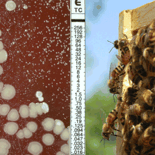
mBio
Scope & Guideline
Unlocking groundbreaking discoveries in microbiology and virology.
Introduction
Aims and Scopes
- Microbial Ecology and Environmental Microbiology:
Exploring the roles of microbes in natural ecosystems, including their interactions with other organisms and their contributions to biogeochemical cycles. - Clinical Microbiology and Infectious Diseases:
Focusing on the study of pathogenic microorganisms, their mechanisms of disease, and the development of novel diagnostic and therapeutic strategies. - Industrial and Applied Microbiology:
Investigating the use of microbes in industrial processes, including biotechnology, food production, and waste management. - Microbial Genomics and Systems Biology:
Utilizing genomic and computational approaches to understand microbial diversity, function, and evolution. - Public Health and Policy:
Addressing the impacts of microbiology on public health, including antibiotic resistance, vaccination, and global health initiatives.
Trending and Emerging
- Microbiome Research:
The exploration of microbiomes in various contexts, including human health, agriculture, and ecosystems, is rapidly expanding, driven by advancements in sequencing technologies and a better understanding of microbial interactions. - Metagenomics and Bioinformatics:
There is an increasing focus on metagenomic approaches that analyze genetic material from environmental samples, coupled with bioinformatics tools to interpret complex data sets. - Microbial Resistance Mechanisms:
Research on the mechanisms of microbial resistance to antibiotics and other treatments is becoming more prominent, highlighting the need for novel approaches to combat infections. - Sustainable Biotechnology:
The application of microbial processes for sustainability, including bioremediation, biofuels, and waste management, is gaining attention as societies strive for environmentally friendly solutions. - Microbial Interactions and Networks:
Studies examining the interactions among different microbial species and their roles within larger ecological networks are emerging, emphasizing the complexity of microbial ecosystems.
Declining or Waning
- Traditional Microbial Taxonomy:
As the field of microbiology progresses towards genomic and metagenomic approaches, traditional methods of classifying and identifying microbes based on morphological characteristics are becoming less emphasized. - Single-Organism Studies:
Research focusing solely on individual microbial species is decreasing as there is a growing recognition of the importance of microbial communities and their interactions in various environments. - Basic Laboratory Techniques:
There has been a noticeable decline in publications centered around basic microbiological techniques, as more researchers are adopting advanced technologies and methodologies for their investigations. - Antibiotic Discovery:
While still important, the frequency of papers focused specifically on the discovery of new antibiotics may be waning due to the shift towards understanding resistance mechanisms and alternative therapeutic strategies.
Similar Journals

Jundishapur Journal of Microbiology
Advancing microbial knowledge for a healthier tomorrow.Welcome to the Jundishapur Journal of Microbiology, a peer-reviewed publication dedicated to advancing the field of microbiology. Published by BRIEFLAND, this journal focuses on key areas such as infectious diseases and medical microbiology, offering a platform for researchers to share their findings from 2009 to 2024. Despite its current positioning in Quartile 4 across various categories in 2023, the journal provides a valuable resource for budding scientists and established professionals alike, contributing to the growing body of knowledge in these critical areas. While it is not an open-access journal, the Jundishapur Journal prioritizes the dissemination of research in the Netherlands, facilitating a deeper understanding of microbial science and its implications for public health. Join a community of innovators committed to exploring both emerging and established themes in microbiology.
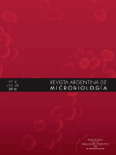
REVISTA ARGENTINA DE MICROBIOLOGIA
Connecting experts to foster innovative microbiological insights.REVISTA ARGENTINA DE MICROBIOLOGIA, published by the ASOCIACION ARGENTINA MICROBIOLOGIA, stands as a prominent open-access journal in the field of microbiology and medicine since its establishment in 1979. With an ISSN of 0325-7541 and an E-ISSN of 1851-7617, this journal has paved the way for disseminating high-quality research while enhancing accessibility for academics and practitioners worldwide. The journal has achieved notable rankings, being classified in Q3 for Medicine (miscellaneous) and Q3 for Medical Microbiology in 2023, reflecting its commitment to advancing knowledge in these critical areas. Despite its relatively modest impact factors, it occupies a vital niche in the academic landscape, fostering collaborations and innovative research among experts. With Open Access available since 2013, REVISTA ARGENTINA DE MICROBIOLOGIA not only facilitates widespread distribution of valuable scientific information but also empowers researchers, professionals, and students to stay abreast of the latest findings and developments in microbiology. For those engaged in the evolving realm of microbiology, this journal serves as an essential resource for sharing insights and advancing the scientific community.

JOURNAL OF BASIC MICROBIOLOGY
Elevating Knowledge in Microbial ResearchJOURNAL OF BASIC MICROBIOLOGY is a premier publication in the field of microbiology, published by WILEY since 1985. With a significant presence in Germany, this journal encompasses a wide spectrum of research topics, focusing on applied microbiology and biotechnology as well as diverse areas within medicine. Holding a commendable Q2 ranking in both its categories for 2023, it plays a crucial role in disseminating innovative findings and methodologies to the community. Researchers will find it to be an essential platform for sharing high-quality work, where it currently stands at rank #47 in the applied microbiology and biotechnology category, representing the 63rd percentile among international journals. The JOURNAL OF BASIC MICROBIOLOGY caters to a growing audience of professionals and students, offering insights essential for advancement in microbiological research and its applications. While it does not currently offer an Open Access option, it remains an influential outlet for academic excellence, continuously contributing to the development of the field through its rigorous peer-reviewed articles.

JOURNAL OF MICROBIOLOGY
Leading the charge in microbiological research and innovation.JOURNAL OF MICROBIOLOGY, published by the Microbiological Society Korea, is a prestigious peer-reviewed journal dedicated to the advancement of knowledge in the fields of microbiology, applied microbiology, and biotechnology. Established in 1996, this journal serves as a vital platform for researchers and professionals from around the globe to disseminate their findings and engage in multidisciplinary discussions pertaining to microbial sciences. With an H-index that reflects its impact, the journal holds a commendable Q2 ranking in key categories including Applied Microbiology and Biotechnology, as well as Medicine (Miscellaneous), which underscores its significance in the academic community. Despite being a subscription-based journal, the JOURNAL OF MICROBIOLOGY aims to contribute to the understanding of microbial processes and their applications, facilitating advancements that are essential in health, industry, and environmental sciences. Researchers, students, and practitioners are encouraged to explore this rich resource for the latest research and trends in microbiology.
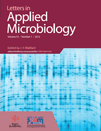
LETTERS IN APPLIED MICROBIOLOGY
Innovating Insights in Applied MicrobiologyLETTERS IN APPLIED MICROBIOLOGY, published by OXFORD UNIVERSITY PRESS, is a prominent journal in the field of applied microbiology, serving as an essential platform for researchers and professionals to disseminate innovative findings. With an ISSN of 0266-8254 and an E-ISSN of 1472-765X, this peer-reviewed journal has been contributing to the scientific community since 1985 and continues to engage with cutting-edge research through 2024. With its current Scopus ranking placing it in the 45th percentile of its category, specifically at rank #70 out of 127 in the Applied Microbiology and Biotechnology field, it underscores its significance in advancing knowledge and applications pertinent to microbial science. Although it is not open access, LETTERS IN APPLIED MICROBIOLOGY offers comprehensive insights aimed at enhancing the understanding of microbiological phenomena in practical scenarios, making it a valuable resource for both seasoned experts and emerging scholars.
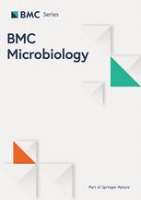
BMC MICROBIOLOGY
Innovating the future of microbiology, one study at a time.BMC Microbiology is a leading open access journal published by BMC, dedicated to advancing the field of microbiology since its inception in 2001. With an ISSN of 1471-2180, this journal provides a vital platform for researchers, professionals, and students to share and access high-quality research and innovation in both general and medical microbiology. Based in the United Kingdom, BMC Microbiology holds a commendable Q2 ranking in both various microbiological categories according to the 2023 Scopus rankings, indicating its strong influence in the microbiological community, with a rank of #47 out of 140 in Medical Microbiology and #62 out of 182 in general Microbiology. The journal's commitment to open access ensures that groundbreaking research is freely available to facilitate collaboration and knowledge sharing among the global community of microbiologists. With a focus on publishing original research, reviews, and case studies, BMC Microbiology plays a critical role in disseminating information that can impact health and environmental conditions around the world.
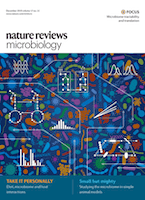
NATURE REVIEWS MICROBIOLOGY
Championing Innovation in Microbial StudiesNATURE REVIEWS MICROBIOLOGY, published by NATURE PORTFOLIO, stands as a leading journal in the field of microbiology, distinguished by its Q1 ranking in multiple categories, including Immunology, Infectious Diseases, and Microbiology for 2023. With an impressive niche impact factor, this journal serves as a vital resource for researchers, professionals, and students seeking comprehensive and cutting-edge reviews on various aspects of microbiology and immunology. Operating from the United Kingdom, the journal covers a wide range of topics reflecting the rapid advancements in the field, while maintaining rigorous editorial standards. Although it does not offer open access, the journal’s articles are essential for anyone aiming to stay at the forefront of microbial research and infectious disease studies. Established in 2003, it continues to thrive as a premier source of knowledge, offering critical insights into ongoing microbial challenges and innovations in research, thereby contributing significantly to our understanding of microbiological complexities.
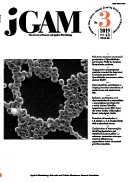
JOURNAL OF GENERAL AND APPLIED MICROBIOLOGY
Bridging theory and application in microbial science.JOURNAL OF GENERAL AND APPLIED MICROBIOLOGY, published by the MICROBIOL RES FOUNDATION, is a vital resource in the fields of applied microbiology and biotechnology, as well as in diverse medical applications, serving an academic community dedicated to advancing microbial science. Established in 1955, this journal has a rich history of disseminating innovative research and insights into the intricate world of microorganisms. With an ISSN of 0022-1260 and an E-ISSN of 1349-8037, the journal maintains high scholarly standards and robustness, reflected in its 2023 Scopus rankings placing it in the Q3 and Q4 quartiles within its categories. While primarily based in Japan, the journal engages a global audience, offering valuable contributions that inform both theoretical perspectives and practical applications in microbiology. Despite being a non-open-access publication, it provides pivotal research findings essential for academics, professionals, and students alike, fostering a deeper understanding of microbial impact on health and the environment.

ARCHIVES OF MICROBIOLOGY
Empowering Researchers with Cutting-Edge MicrobiologyThe Archives of Microbiology, published by Springer, is a reputable journal in the field of microbiology, serving as a vital platform for the dissemination of groundbreaking research and critical reviews since its inception in 1974. With an ISSN of 0302-8933 and an E-ISSN of 1432-072X, this journal operates out of Germany and maintains a global reach, promoting high-quality scholarship across multiple disciplines, including biochemistry, genetics, and molecular biology, as evidenced by its Q2 ranking in Medicine (miscellaneous) and consistent Q3 placements in other categories in 2023. Although the journal does not offer open access options, its rigorous peer-review process ensures that published articles are of the highest standard, making it an essential resource for researchers, professionals, and students keen on advancing their understanding of microbial sciences. As the journal converges toward 2024, it remains committed to fostering innovative microbiological research and facilitating interdisciplinary dialogue within the scientific community.

Lancet Microbe
Advancing the Frontiers of Microbial ResearchThe Lancet Microbe is a leading peer-reviewed journal published by ELSEVIER, focused on advancing research in the fields of infectious diseases, microbiology, and virology. Since its inception in 2020, this open-access journal has rapidly achieved a prestigious reputation, evidenced by its impressive rankings in the Scopus Ranks, where it holds positions within the top 10 in multiple categories and boasts high percentiles, reflecting the impact and relevance of its published works. With a quarterly publication schedule, the Lancet Microbe aims to disseminate critical findings and foster innovation within the scientific community, providing a platform for researchers and professionals to share their significant contributions. The journal is committed to facilitating knowledge exchange and accessibility, making it an essential resource for academicians and practitioners dedicated to addressing global health challenges.